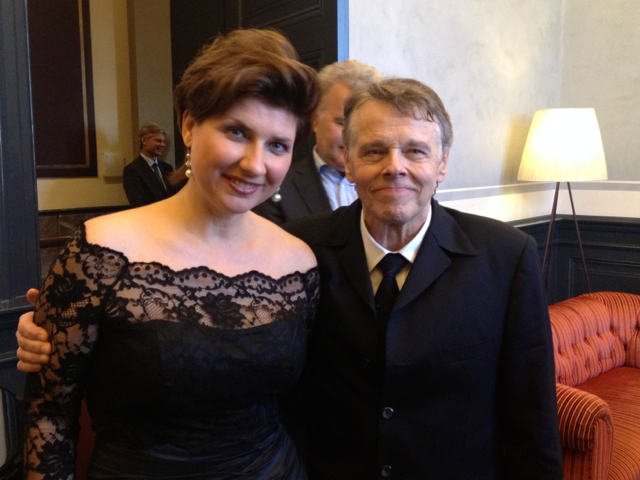
DEMNÄCHST/NEXT
August 21, 2016 Festival de la Chaise Dieu - Orchestre National de Lyon - WAGNER: Wesendonck Lieder (Wesendonck Songs)
http://www.auditorium-lyon.com/fr/Programmation-16-17/Symphonique/Hors-les-murs/Festivals-d-ete/Festival-de-La-Chaise-Dieu
KÜRZLICH/RECENTLY
AMSTERDAM 24.1.2016 BRAHMS: Ein Deutsches Requiem
https://bachtrack.com/de_DE/review-german-requiem-netherlands-radio-choir-amsterdam-january-2016
http://www.operamagazine.nl/featured/35387/mattei-en-mikolaj-sieren-brahms-requiem/
The questioning of the baritone and the chorus is answered in Part Five by the soprano with consoling words. Aga Mikolaj’s voice, spun with assured calm, was halfway between angelic and womanly, fulfilling the intent of this solo.
PARIS: Theatre Champs Elysees Verdi Requiem - Forumopera.com (Antoine Brunetto 18.5.2015)
"La soprane Aga Mikolaj, élève de Dame Elisabeth Schwarzkopf, séduit par son engagement intense, quasi expressionniste dans le « Libera me."
Review Concert Bournemouth 6.5.2015 - http://www.bournemouthecho.co.uk/leisure/reviews/12936106.BSO___Verdi_s_Requiem/
.....Goosebumps abounded during Libera me, the oldest piece in the Requiem, where Soprano Aga Mikolaj astounded with her exquisite voice and range.....
20.2.2015 & 21.2.2015 2 Reviews
Boston Classical review by Aaron Keebaugh -Full review:
http://bostonclassicalreview.com/2015/02/polish-soprano-soars-in-strauss-and-mahler-with-boston-philharmonic/
Jonathan Blumhofer TELEGRAM & GAZETTE REVIEWER
http://www.telegram.com/article/20150221/NEWS/302219760/1312&template=MOBILE
Excerpts (Ausschnitte) from Boston Classical:
Polish soprano Aga Mikolaj was in full command of each song, coloring her voice to reflect Strauss’s musical depictions of the poems. In “Frühling” she sang with radiant warmth while handling the music’s wide and difficult leaps with grace. Mikolaj’s singing of “September” and “Im Abendrot” was more creamy and lyrical, her tone seeming to glow as if at a distance. “Beim Schlafengehen” was achingly beautiful as Mikolaj imbued her phrases of with hints of longing to capture the life-weary fatigue of Hesse’s poem. -
It’s unusual for sopranos to perform both Strauss and Mahler on a single program as the two composers demand very different things from the singer. But one would have been hard pressed to find a more dexterous performer than Mikolaj. With a voice that is thoroughly rich and gorgeous, she is equally capable of softening her tone without losing its penetrating effect. Whereas her singing in the Strauss was rich and earthy, she delivered her lines in the Mahler with a light, nimble touch, her upper notes taking on an innocent, boyish quality. Supporting her was a silvery stream of orchestral accompaniment that occasionally burst into passages of swirling energy, which the orchestra rendered with equal parts bite and bounce.
Excerpts (Ausschnitte) from Telegram.com:
Without a doubt, the highlight of Friday's somewhat-somnolent program was soprano Aga Mikolaj's marvelous performance of Richard Strauss's "Four Last Songs." Written in the last year of Strauss' life and conceived as a very intentional valediction, these settings of poems by Hermann Hesse and Josef von Eichendorff are filled with sumptuous, Straussian touches. There's a huge orchestra. Harmonically, they're lushly tonal but unsettled by subtle chromaticism. To pull off, they require a singer who can convey worldly experience (if not world-weariness) yet spin out the simple-sounding (but by no means easy) lyricism of Strauss' vocal writing with clarity and sympathy. Mikolaj is just such a singer. Her tone is warm, rich, and pure; her intonation spot-on. She sings with deep understanding and musical intelligence. There's a remarkable sense of her complete comfort with and assimilation of these Lieder. Whether expressing the wonder inherent in the first ("Frühling"), the soft melancholy of the second ("September"), the gentle nostalgia of the third ("Beim Schlafengehen"), or the resignation of the finale ("Im Abendrot"), her performance on Friday was utterly compelling, conveying exactly the expressive affects the music endeavors to divulge.
But the apex was reached when Mikolaj returned to sing the finale, a setting of a poem that describes a simple, innocent vision of heaven. The score calls for this movement to be "sung with childlike and serene expression" but not parody. In many ways, it's the polar opposite of the type of singing required for the Strauss. On Friday, Mikolaj was as convincing an interpreter of this music as I've ever heard, her crystalline tone evoking not just a purity of vision but also a sincerity of message. One imagines Mahler, himself a mighty conductor and accompanist, would have approved of the delicate, "discreet" support provided her by Zander and the BPO.
Don Giovanni Ravinia Festival (Chicago) - Chicago Symphony Orchestra - James Conlon
Chicago Tribune John von Rhein 16.8.2014
It was hard to single out individual performances for praise, given the fact that everyone was so good, although I'd advise Lyric Opera to keep several singers on its watch-list – certainly Maltman, Aga Mikolaj (Donna Elvira) and David Bizic (Leporello).
A Polish-born soprano who's active in opera and concerts throughout Europe, Mikolaj scored a memorable local debut as Elvira, the most complex character in the opera – a vulnerable young woman deeply torn between her love for the faithless Giovanni and her determination to avenge his betrayal of her. Seldom will you hear Elvira's big showpiece aria, "Mi tradi," delivered with such velvety, beautifully sustained tone, secure top register, facility in florid passages and blazing temperament. Chicago deserves to hear more of Mikolaj.
http://chicagoclassicalreview.com/2014/08/conlon-restores-a-welcome-intimacy-to-don-giovanni-at-ravinia/
Polish soprano Aga Mikolaj’s Donna Elvira was the most consistent of the female leads, allowing her sense of shattered self-worth and resignation to color her vocal nuances.
Aga Mikolaj sang with the BBC Orchestra 6 songs by Richard Strauss life transmitted by BBC Radio
Since 1999 MusicWeb International's Site for Concerts, Operas & Ballets - Kritik (Review by) Michael Cookson
Susan Gritton the advertised soprano was ill and unable to perform. As a short notice replacement Polish soprano Aga Mikolaj, no stranger to Strauss’s music, grabbed her opportunity with both hands. Dressed in a turquoise and black gown the tall Mikolaj looked stunning and in fine voice poured an abundance of feeling into all six Strauss orchestral songs. Showing a compelling intimacy the appealing Wiegenlied (Cradle Song) was sung with a dreamy charm and the beautiful Morgen! (Tomorrow!) contained a tender, heartfelt quality assisted by a vivid solo from guest leader Zoë Beyers. Within the rich toned character of Waldseligkeit (Forest Rapture) Mikolaj’s perceptive rendition had an innate sense of introspection. Mikolaj has a creamy timbre and a dark, mezzo-like richness in her low register with sufficient weight to project satisfyingly through the hall without strain. Although Mikolaj is not a native German speaker I was easily able to follow the text; however, a slight diction issue did allow her word endings to tail off. A pupil of the late Dame Elisabeth Schwarzkopf and a former member of the Bayerische Staatsoper, Mikolaj graced the Bridgwater Hall and should be welcomed back with open arms.
To listen to these songs go to the following Internet page from BBC (available for around 2 weeks) http://www.bbc.co.uk/programmes/p01rzr56
Aga Mikolaj steps in to sing in Verdi's Messa da Requiem with the Royal Concertgebouw Orchestra conducted by Mariss Jansons on 27 and 29 September. The dates mark her debut with the orchestra, and her first collaboration with Mariss Jansons.

The concerts follow a successful summer for Mikolaj, including her critically acclaimed appearance at the BBC Proms in Das Rheingold, with the Staatskapelle Berlin conducted by Daniel Barenboim.
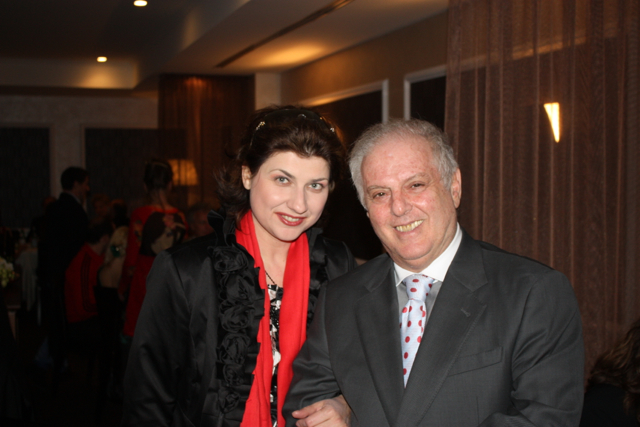
...and Aga Mikolaj, Maria Gortsevskaya and Anna Lapkovskaja formed the finest trio of Rhinemaidens to be heard for ages". "The Guardian London" Tim Ashley
Das Rheingold review
The irony is that in its Woglinde, this performance had the most perfect Gutrune and Third Norn – and Sieglinde, and Salome - imaginable, a really effortless, sweet-toned-yet-steel-cored full-bodied lyric of absolutely immaculate technical control and simply gorgeous soprano sound: Aga Mikolaj. One to watch, past question.
Stephen Jay-Taylor - Opera Britannia
Götterdämmerung / Staatsoper Berlin / Teatro alla Scala / Aga Mikolaj / Maria Gortsevskaya / Anna Lapkovskaja / Ian Storey
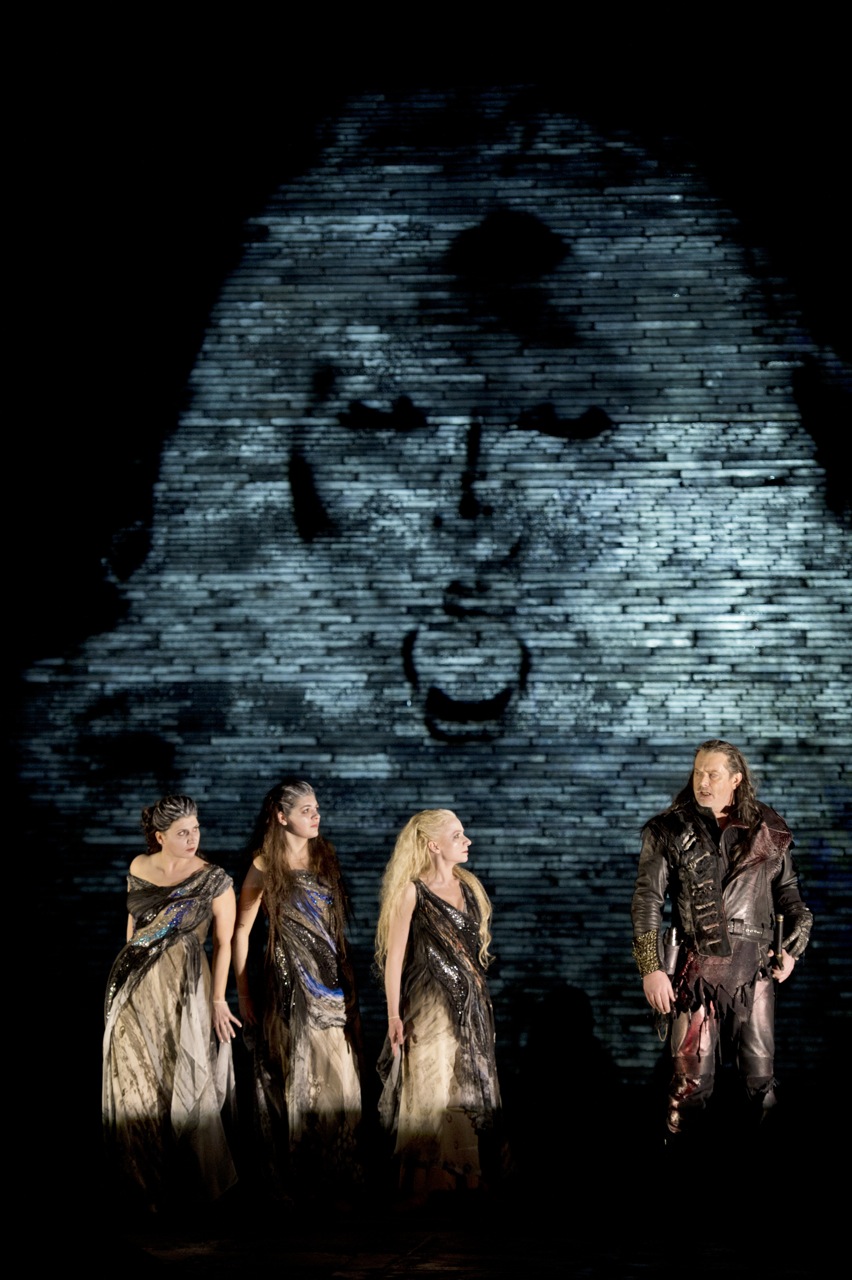
Das Rheingold / Staatsoper Berlin / Teatro alla Scala / Aga Mikolaj / Maria Gortsevskaya / Marina Prudenskaya
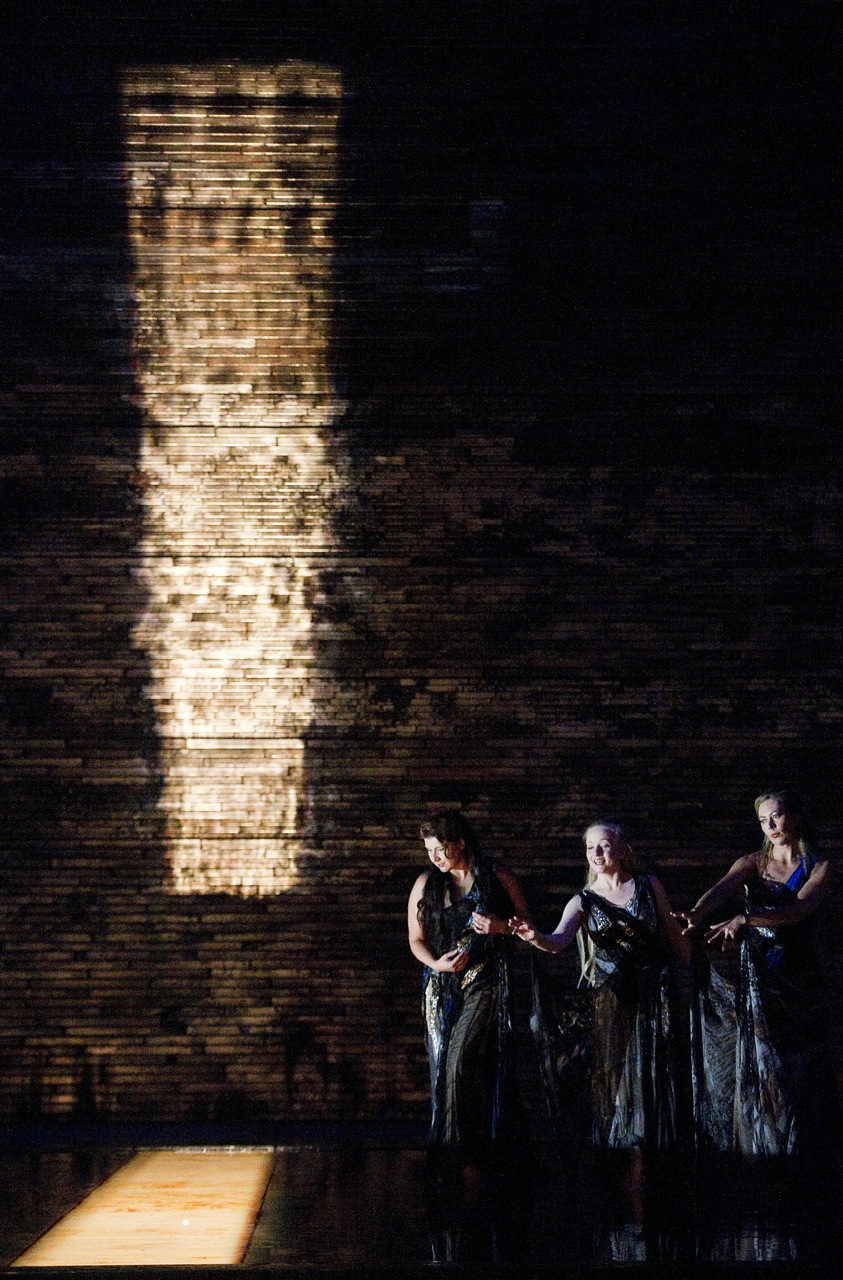
Fotos Das Rheingold & Götterdämmerung © Monika Rittershaus
Aga Mikolaj´s neue CD - Aga Mikolaj´s new CD - (erhältlich seit 15.12.2012 - available since 2012-12-15)
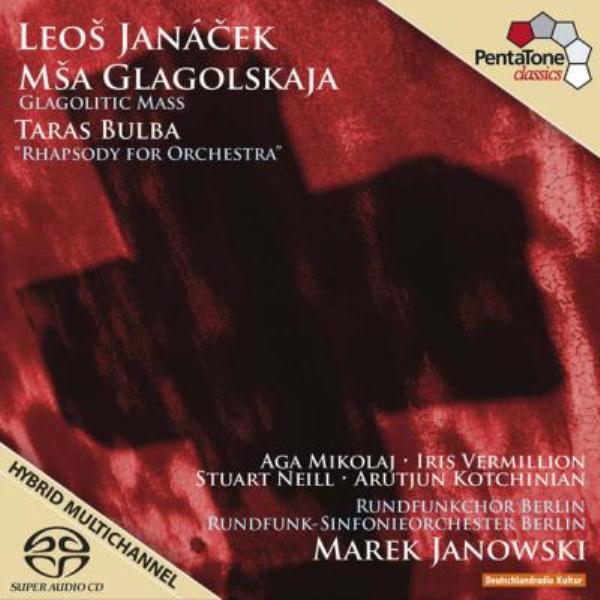
ZULETZT/LATEST NEWS
.jpg)
Rheinische Philharmonie - Konzerte in Ludwigshafen - (Die Rheinpfalz 18.12.2012 von Gabor Halasz)
Glanzpunkte wusste zudem die Solistin des Abends zu setzen: die polnische Sopranistin Aga Mikolaj. Mit ihrer hell getönten, strahlenden Stimme setzte Mikolaj eminent einfühlsam und feinsinnig ein, erwies sich als Koloraturvirtuosin von Format („Exsultate, jubilate“!) und wartete im langsamen Satz der „Vesperae Solennes“ und in Mendelssohns Weihnachtskantate „Vom Himmel hoch“ mit anrührendsten Herztönen auf.
Indianapolis Symphony Orchestra, Brahms: "Ein Deutsches Requiem - A German Requiem" November 2012 (Tom Aldridge 11/ 2012)
Aga Mikolaj provided the latter voice for Part V: "Ihr habt nun Traurigkeit" ("And ye now therefore have sorrow"), in turn giving us splendid vocalism: powerful, well projecting and evenly centered. Mikolaj made that part the high point of the evening.
Don Giovanni Los Angeles Philharmonic Orchestra at Disney Hall in Los Angeles (May 2012)
Soprano Carmela Remigio as Donna Anna was compelling in a superbly vocalized performance, matched and exceeded only by brilliant soprano Aga Mikolaj as Donna Elvira. Her fabulous black frock added greatly to the visual impact of her performance, especially in the opera’s (many) final pages.
Aga Mikolaj in "Don Giovanni." Mikolaj, as Elvira, balancing atop fashionista killer heels, sings with color and confidence.
By Manuela Hoelterhoff - May 23, 2012
The women also were all very nicely cast. Of the three, my favorite by the end of the night was Aga Mikolaj singing Donna Elvira. She displayed a sumptuous voice that could be blustery or tender as needed, while imbuing her role with just the right mix of anger and desperation
Dressed all in black, like a stalking bird of prey, Mikolaj strikes an imposing figure as Donna Elvira, constantly torn between her love for Don Giovanni and the realization that he is an irredeemable philanderer. It's an inner conflict that culminates with the pyrotechnical aria, "Mi tardi quell' alma ingrata." And Mikolaj ignites the moment to dazzling effect.
By Jim Farber, Correspondent Posted: 05/21/2012
Aga Mikolaj im Interview zusammen mit Karl Sollak im neuen "Orpheus"
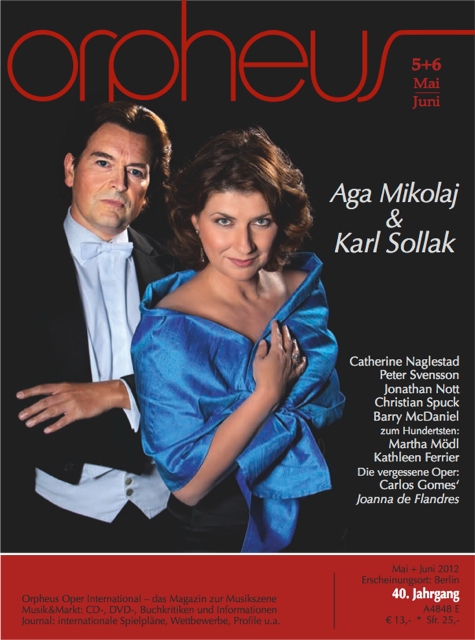
Das Rheingold Bayerische Staatsoper München February 2012
Aus der überzeugenden Götterfraktion ragt die exzellente Freia von Aga Mikolaj heraus.
Wiener Zeitung 6.2.2012 (Joachim Lange)
Carmen Bayerische Staatsoper München Oktober 2011
....Gebremster Applaus daher für die Kasarova, während Aga Mikolaj für die mütterlichen Seelentöne ihrer Micaela heftig gefeiert wurde.
Münchner Merkur 11.10.2011 (Markus Thiel)
Concert in Bergen (Norway) September 2011
Konsertens desiderte høydepunkt var Karol Szymanowskis «Kjærlig hetssanger» opus 26 med tekst av den berØmte persiske poeten Hafez.
Med forbilledlig instrumentasjon og overraskende dramaturgi er dette stor komposisjonskunst i overgangen fra den senromantiske stil og efter følgende mer moderne retninger. Solist Aga Mikolai var et ypperlig valg, og med sin følsomme og vakre sopranstemme formidlet hun de per siske eventyrfortellingene med ut søkt eleganse og sjarm.
The big highlight of the concert was the performance of Karol Szymanowkis' "Hafis Love-songs"....
Soprano Aga Mikolaj was a splendid choice. With her soft and sensitive soprano voice she sung and distributed the persian fairytales with great elegance and charm.
Carmen Bayerische Staatsoper München Februar 2011
Micaela zieht der Carmen davon
Was selten vorkommt und in der Phonezahl deutlich vom Publikum honoriert wurde: Die Micaela war die Stimme des Abends. Die Polin Aga Mikolaj verfügt über einen klaren, großen Sopran von Wärme und Schmelz, vor allem aber von Kultur - eine Freude.
Beate Kayser TZ München 4.02.2011
..Großer Jubel, eh klar, auch für die herzlich-warme, mit enormen Verve und leuchtender Stimme ausgestattete Aga Mikolaj als Micaela..
Egbert Tholl - Süddeutsche Zeitung
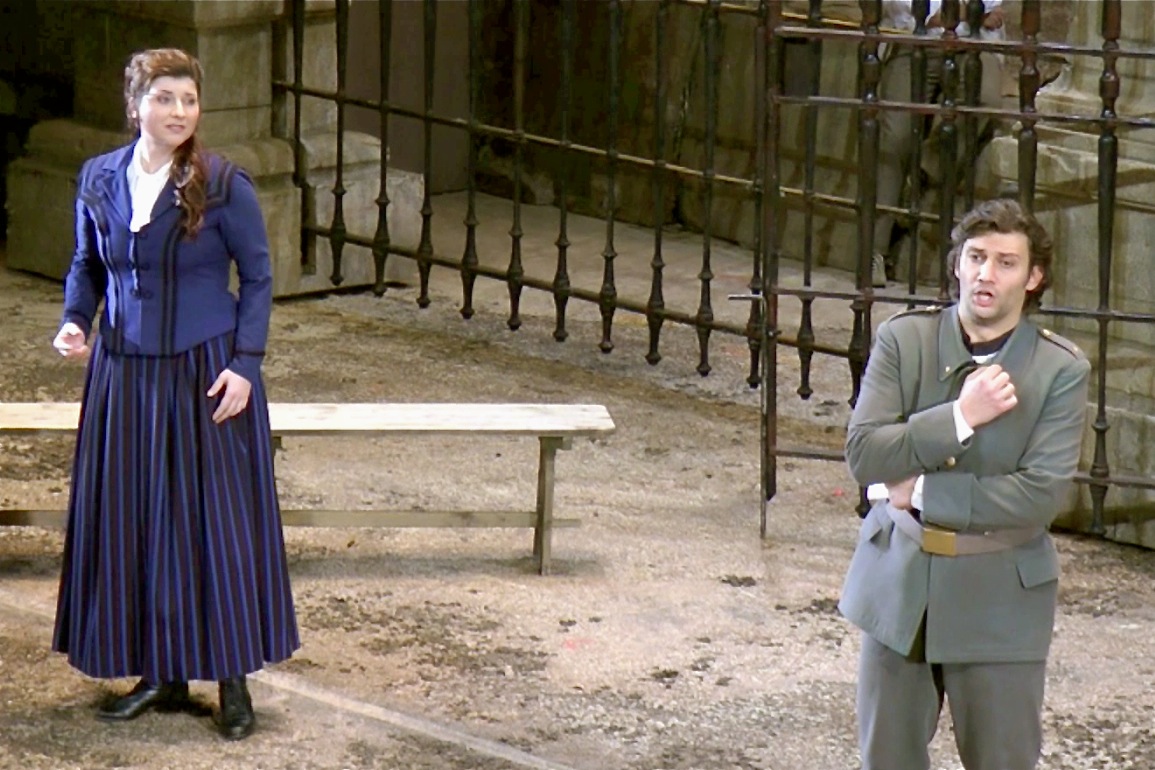
AGA MIKOLAJ ausgezeichnet mit der Rose der "TZ München" für Ihre Interpretation der Micaela in "Carmen" an der Bayerischen Staatsoper
Aga Mikolaj was honored with the "Rose" a special award of the newspaper "TZ Munich" for her interpretation of Micaela in "Carmen" at the Bavarian State Opera.
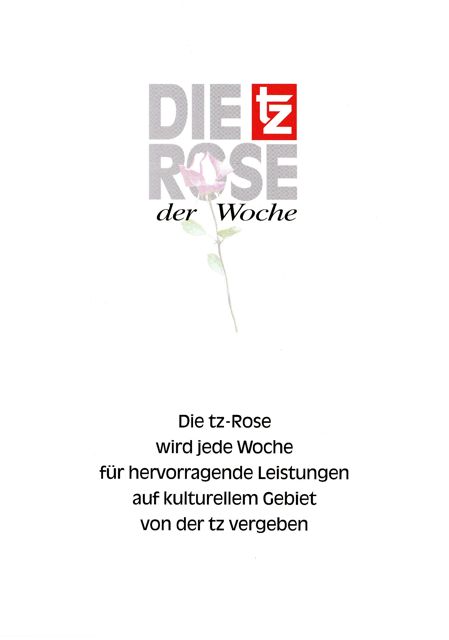
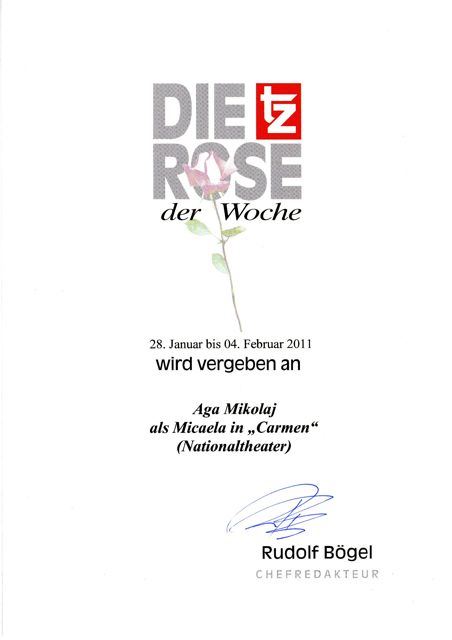
erhältlich (available) online bei (at) www.jpc.de oder in guten Fachgeschäften (or in every good recording store)
mit Werken von Richard Strauss (4 letzte Lieder, Ausschnitte aus Capriccio und Ariadne auf Naxos) sowie Arien von Mozart
WDR Rundfunkorchester, Dirigent: Karl Sollak
Opernwelt 7 / 2011: "Aga Mikolaj besitzt eine der gegenwärtig schönsten Stimmen im Mozart - und auch Strauss-Fach."
hören Sie daraus
Ariadne auf Naxos: "Es gibt ein Reich...."
weitere Musikbespiele auf meiner Audio Seite (more samples on my page: listen to Aga Mikolaj)
FALSTAFF Monte Carlo (Alice Ford) mit Bryn Terfel (with Bryn Terfel in Falstaff)
Das "Who is Who" der Sänger
Bryn Terfel ist seit der Staatsopernpremiere 2003 zu einem grandiosen Sir John Falstaff gereift. Mit seiner Bühnenautorität füllt er die verschiedenen Facetten des Charakters aus und schöpft stimmlich aus dem Vollen. Auch der Rest des Ensembles kann sich hören lassen, vor allem Aga Mikolaj als Alice mit geschmeidigem Sopran und Fabio Capitanucci als ausdrucksstarker und gehörnter Ford.
Wiener Zeitung 23.3.2010